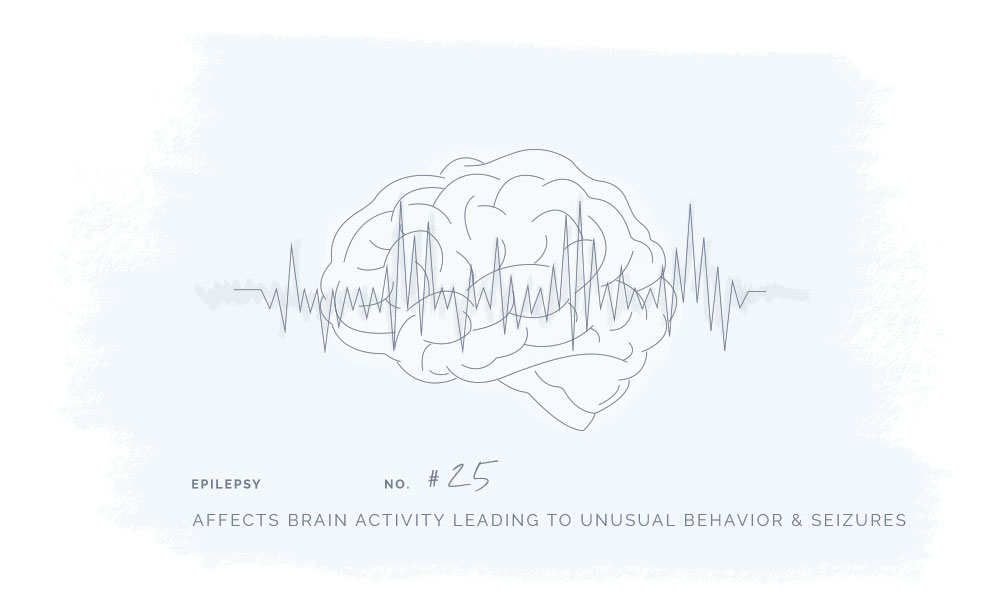Epilepsy
Category
Genetic, Neurological
REVIEWED BY
Our Biomedical Scientist
Reviewed based on
Literature Discussion & Clinical Trials
Last update
September 2020

What is Epilepsy
Epilepsy is a neurological disorder that affects a person´s normal brain activity, leading to seizures, periods of unusual behavior, and sensations.1
Symptoms
The development of the type of seizure depends on where the disturbance of brain activity begins and how far it spreads to other regions of the brain. Temporary symptoms may be but are not limited to:2
- Uncontrollable movement
- Sensations in both vision, hearing, and taste e.g. staring spell
- Mood changes
- Cognitive impairment e.g. fear, anxiety, and Déjà vu
Types of seizures1
Focal seizures
Affect only one-area of the brain and is thereby partial (focal)
- Focal seizure with no loss of consciousness (temporary symptoms)
- Focal seizure with loss of awareness and consciousness
Generalized seizures
Six types of seizures exist and they affect all areas of the brain.
- Absence seizures
- Tonic seizures
- Atonic seizures
- Clonic seizures
- Myoclonic seizures
- Tonic-clonic seizures
Cause
Up to this date, the exact cause of epilepsy is not fully understood, meaning that about half of the patients suffering from epilepsy do not know what caused this condition. In the other half of the patients, epilepsy may be due to the following factors:2
- Genetics
- Trauma to the head e.g. a traumatic head injury from a traffic accident
- Other brain diseases e.g. stroke and/or tumors
- Infectious diseases e.g. meningitis, AIDS
- Injury of the fetus during pregnancy e.g. lack of oxygen or malnutrition
- Developmental disorders e.g. autism
The connection between Cannabinoids & Epilepsy
Studies find that CBD and THC may have great therapeutic potential and may be used to help treat Epilepsy. CBD and THC are well-known cannabinoids, however, they do not have the same psychoactive effects. THC is psychoactive while CBD does not possess psychoactive effects. According to WHO guidelines, the cannabidiol CBD is generally well tolerated with a good safety profile.
It is suggested that several cannabinoids may be therapeutic in the treatment of epilepsy as plant cannabinoids and several terpenes can play a role in boosting the endocannabinoid system and aid in maintaining neuronal activity balance.3
In addition, it is suggested that seizure control can be improved by the adjunctive use of CBD in people suffering from specific epilepsy syndromes.4
The literature discussion is an overview of the published results from scientific studies investigating if and how cannabinoids can be beneficial in the treatment of Epilepsy. The overview will be updated regularly to ensure the newest and most accurate information.
CBD & THC may possess anti-seizure properties
In the rat PTZ model of epilepsy, seizure incidence was shown to be reduced by THCV (0.25 mg/kg).5
In a mouse model of epilepsy (Maximal Electro Shock), CBD (120 mg/kg), Δ9THC (100mg/kg), 11-OH-Δ9THC (14 mg/kg), 8β-OH-Δ9THC (100 mg/kg), Δ9THCacid (200–400 mg/kg), Δ8THC (80 mg/kg), CBN (230 mg/kg), and Δ9α/β-OH-hexahydro-CBN (100 mg/kg) were shown to exhibit anti-convulsive
anti-convulsive effects.6
Clinical trials are research studies that examine new treatments and evaluate their effects on human health outcomes.
CBD have shown to improve quality of life and decrease occurrence of seizures
Two clinical trials in the 1980s aimed to assess the therapeutic effects of CBD in epilepsy. It was demonstrated that CBD produced positive effects in 50% of patients, with seizure occurrence being reduced by >50%.7,8
It was also shown that quality of life was improved by CBD in children with epilepsy.9
- https://www.mayoclinic.org/diseases-conditions/epilepsy/symptoms-causes/syc-20350093
- https://www.who.int/news-room/fact-sheets/detail/epilepsy
- https://ghmedical.com/endocannabinoid-system/diseases/epilepsy
- Perucca, E., (2017). “Cannabinoids in the Treatment of Epilepsy: Hard Evidence at Last?”. https://www.ncbi.nlm.nih.gov/pmc/articles/PMC5767492/
Literature - Hill et al., (2010). ” Δ9-Tetrahydrocannabivarin suppresses in vitro epileptiform and in vivo seizure activity in adult rats: Anticonvulsant Potential of Δ9-THCV. Epilepsia 51, 1522–1532”. https://pubmed.ncbi.nlm.nih.gov/20196794/
- Devinsky et al., (2014). ”Cannabidiol: pharmacology and potential therapeutic role in epilepsy and other neuropsychiatric disorders. Epilepsia 55, 791–802”. https://pubmed.ncbi.nlm.nih.gov/24854329/
clinical - Cunha et al., (1980). ”Chronic administration of cannabidiol to healthy volunteers and epileptic patients. Pharmacology 21, 175–185”. https://pubmed.ncbi.nlm.nih.gov/7413719/
- Pickering et al., (2011). ”Cannabinoid effects on ventilation and breathlessness: a pilot study of efficacy and safety. Chron. Respir. Dis. 8, 109–118”. https://pubmed.ncbi.nlm.nih.gov/21436223/
- Rosenberg et al., (2017). ”Quality of Life in Childhood epilepsy in pediatric patients enrolled in a prospective, open-label clinical study with cannabidiol. Epilepsia 58, e96–e100”. https://pubmed.ncbi.nlm.nih.gov/28617940/
CANNABINOIDS & RECEPTORS
Below you find the plant cannabinoids, cannabinoid receptors, and endocannabinoids that are associated with the potential therapy.
- CBN
- CBD
- THC
- THCA
- THCV
- 11-OH-Δ9-THC
- Δ8THC
- CBDV
- CB1
- CB2
- TRPV1
- GPR55,
- GlyR
- BK
- Anandamide
- PEA
- 2AG
If you have any further information relevant to the connection between Epilepsy and cannabinoids or find any of the information inaccurate, outdated or incomplete please contact us here.

